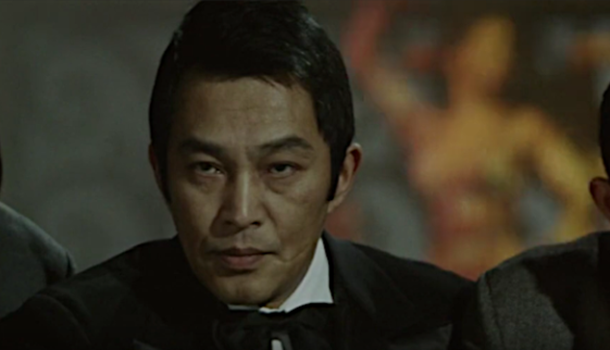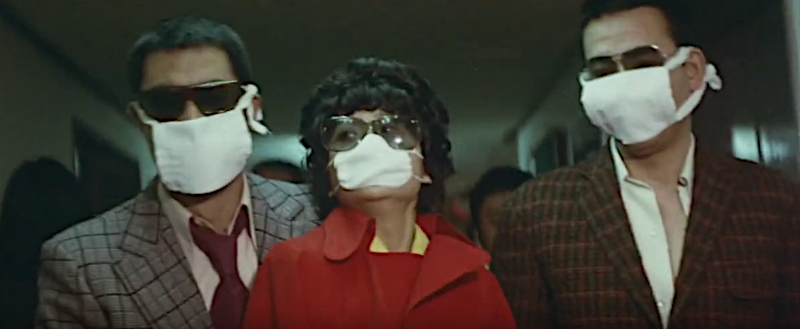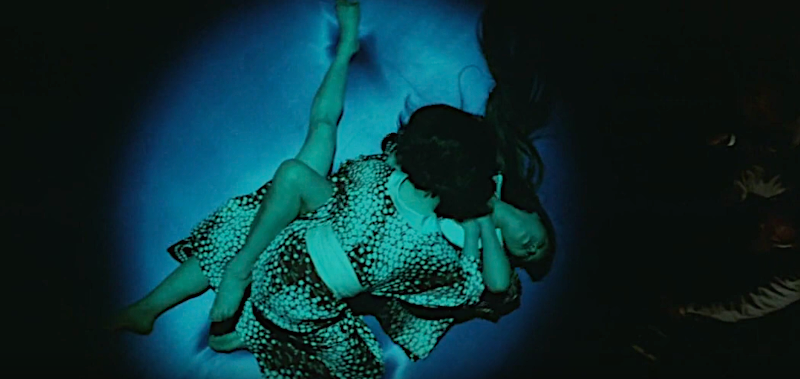
Written by Richard Durrance on 21 Feb 2023
Distributor Eureka - Masters of Cinema • Certificate 15 • Price £16.99
It’s easy to see Hideo Gosha’s 1974 Violent Streets as a Battles Without Honour or Humanity type clone, or at best a potboiler, with a standard plot and cookie cutter characters - and to an extent you’d be right. But only to an extent.
Like Radiance’s recent rediscovery and release of Big Time Gambling Boss, there is something different about Violent Streets that, for all that the narrative beats are mainly familiar, it rises above the average.
Ex-Yakuza, Egawa, is enjoying his life running his flamenco themed nightclub, though his old hot-headed friend, Yazaki, wants him to rejoin their Togiku clan as a rival group is moving into Tokyo and Egawa’s nightclub is prime Ginza real estate. Resisting the urge to rejoin his clan, things start to get out of hand when Togiku-backed rising TV star Minami is kidnapped, held to ransom by friends of Egawa who hope to make money out of the nascent yakuza turf war, and so Egawa is slowly brought back into another internecine yakuza conflict.
One reason to think of the film as a potboiler is how it takes until almost the midpoint of the film to work out what the hell is going on. All the various yakuza clans, affiliations and relationships between the characters are initially damnably bewildering. Who are these people who have kidnapped Minami? Who are they aligned with (if anybody!)? How does this all connect to Egawa, or not? There are shades of the first act of Seijun Suzuki’s great Tokyo Drifter to Violent Streets, though without that film's narrative tightness and coherence. Yet, Violent Streets opens - unusually - to flamenco music and dance, not the expected 70's pop. Our initial introduction to violence, Egawa defending his nightclub from the rote mouthy yakuza wannabes, is brutal yet efficient. Importantly the film never suggests Egawa’s sudden violent action is something to be celebrated or admired, rather it simply "is". It also gets to the heart of violence; that it is often short, harsh and unpleasant. The film takes the same approach throughout, never glorifying any of its bouts of violence nor does it revel in them, instead often it is effective because it shies away from showing too much and gets to the brutal essence of sometimes life-or-death violence.
And though the film does explode into moments of violence, it never loses its focus on the characters (though it cannot claim to have the clarity that Big Time Gambling Boss brought to its cast), but like that film, Violent Streets watches more from the sidelines and allows us to make up our own mind about what we see without enforcing any moral judgements. Yazaki, for instance, could easily be framed as a violent thug, whereas you can also envision him as being honest, because though his Togiku clan now claim to be a legitimate company, earning money from big business not brutality, the reality is that their dealings are still based on intimidation and violence. At least Yazaki hides none of his true nature, he’s not a hypocrite. Also, the elements that could feel uncomfortable or distasteful never are. For one, there’s a transvestite killer, and in the 70s there was a cinematic spate of these and often you felt that they were treated either sensationally or else as an object of mockery, whereas in Violent Streets they simply "are". Again, the detached focus ensures though the transvestite killer just happens to be both, it’s played neither for laughs nor grotesquery when that could so easily have been the case.

There are some lovely set-pieces too. The kidnapping and subsequent collection of the ransom for the singer Minami has more than a touch of the intentional absurdist about it, that shows the film is unafraid to inject a certain amount of humour to leaven the more nihilistic elements. Equally how all her kidnappers wear monster masks isn’t just for amusements sake it also works into the plot, showing how they can effectively snatch their ransom money. Gosha also works in some fluid camera work, the occasionally smart edit and flashes of gaudy colour, which scrubs up well in the 2K restored print, which looks pretty damn fine. Mainly it’s Gosha’s economy when he needs it that helps the film be more than an also-ran, as perhaps does scar-faced Noboru Ando as Egawa, whose impassive visage centres the film. You can sense in Ando all those various emotional pulls, whether that’s the loss of his fiancé to his ex-boss, the nascent desire to be drawn back into the violent streets and yet wanting to continue living the Ginza bar life; yet when called to be violent it feels real, not just some choreographed action: you can see Ando as a yakuza who could both get close to the top and also get out.
For all that the first half can bewilder you as your brain scrambles to put what you see on screen together, the second part of Violent Streets bursts forth with taut savagery and violent emotions, and is a great addition to the 1970's Japanese cinema that has been released over the last several years. It seemed to have bombed at the box office, but here and now with space, we can see it for what it is; a superior slice of yakuza violent drama that nags at the impossibility of escaping your past or your friends; shot through with an occasionally ironic detachment and never a desire to revel in violence for all the bottles that get smashed over heads (repeatedly) but instead delve into cruel psyches and thematically touches on aspects that many of us even outside violent streets can relate to.


Long-time anime dilettante and general lover of cinema. Obsessive re-watcher of 'stuff'. Has issues with dubs. Will go off on tangents about other things that no one else cares about but is sadly passionate about. (Also, parentheses come as standard.) Looks curiously like Jo Shishido, hamster cheeks and all.
posted by Richard Durrance on 12 Feb 2026
posted by Richard Durrance on 10 Feb 2026
posted by Richard Durrance on 07 Feb 2026
posted by Richard Durrance on 03 Feb 2026
posted by Richard Durrance on 27 Jan 2026
posted by Richard Durrance on 19 Jan 2026
posted by Richard Durrance on 08 Jan 2026
posted by Richard Durrance on 17 Dec 2025